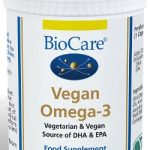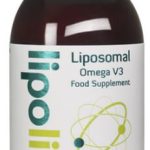Any of our regular customers – or, indeed, any regular reader of this blog – are sure to be aware that just as not all bacteria are bad for us (the intestines, of course, require ‘good’ bacteria among its gut flora), neither are all fats bad for us. A fine example is Omega-3 fatty acids. So much so, in fact, that experts, thanks to a good deal of research, believe this particular group of fats are great for contributing to everything from treating arthritis, dementia and depression to reducing the risk of heart disease and boosting brain health.
The drawback with Omega-3s, though, is that our bodies aren’t capable of synthesising them; we can’t generate them ourselves. Therefore we have to get our fill of them through diet alone – or, alternatively, through supplementation. Now, it’s very commonly known that a great source for them are fish – specifically for the Omega-3 acids that are docosahexaenoic acid (DHA) and eicosapentaenoic acid (EPA), which generally appear to offer the most potent health benefits – but there are other sources too. And the best thing about this is for vegetarians and vegans there are alternative dietary (and now supplement) sources for Omega-3.
Omega 3 health benefits
So, what of these benefits then? Well, perhaps more than anything else, Omega-3 fatty acids are of help when it comes to heart health. Not only are they capable of curbing inflammation in blood vessels throughout the body (thus, easing the pressure of work on the heart), but can also lower heart rate and ensure the development of abnormal heart rhythms (arrhythmias) is less likely and slow down the build-up of plaque in blood vessels (which could also aid in the prevention of suffering a stroke). Research may also suggest heart attack survivors who’ve boosted their Omega-3 levels experience fewer heart attacks and are less likely to suffer a heart disease-caused death1.
Additionally, increased consumption of both DHA and EPA have the capacity to reduce levels of triglycerides (a specific blood fat that’s linked to heart disease), especially when combined with more exercise and lower intake of alcohol, sugary foods and processed carbohydrates, such as white bread and white rice. And it appears Omega-3s are also capable of lowering blood pressure – to some extent, at least – again, not least by complementing one’s Omega-3 intake with other dietary changes (i.e. less red meat and less salt). And, elsewhere in the body, research suggests that stiffness and pain in the joints of rheumatoid arthritis sufferers may experience some relief when these fatty acids are combined with anti-inflammatory medication.
In terms of mental health and brain health, there is a wealth of evidence that Omega-3 acids aids depression. We also know that depression levels tend to be lower in countries where higher levels of Omega-3s are particularly common in typical diets. One Professor of Psychiatry who the company director went to listen giving a lecture a few years ago uses it extensively and routinely in his practise with all depression sufferers. Results take a good 8 weeks to become apparent in many cases, so it should not be regarded as an overnight cure, and those who benefit may need to continue to supplements with Omega 3 for good. But even most mainstream medicines for mental health have to be taken for 4-8 weeks to assess their effectiveness, and are often taken on a long term basis , whilst all the while having potentially harmful and dangerous side-effects, whereas side-effects from supplementing with Omega 3’s are almost unheard of. It’s now accepted that that essential fatty acids play a contributory role in brain function and the development of this organ; some too believe, based on research, that they may be able to help alleviate symptoms of attention deficit hyperactivity disorder (ADHD), the suggestion being that they ought to be looked upon as supplementary to traditional treatment for this condition. Finally, it’s also believed that Omega-3s may be able to help with preventing dementia and age-related brain-function decline. More studies need to be conducted in this area, but research does suggest older people with Omega-3-rich diets are less liable to develop Alzheimer’s disease.
Omega 3 sources – including vegetarian/ vegan-friendly options
As mentioned above, certain fish are, of course, an excellent source for Omega-3 fatty acids – in particular, DHA and EPA. And some fish deliver higher does than others; high-scoring fish in this regard being the likes of anchovies, herring, mackerel, lake trout, salmon and sardines. To that end, the American Heart Association actually recommends you get at least two servings of such fish each week – perhaps with the emphasis on *at least* there!
All that said, it’s important to note you should try to steer clear of fish that may contain relatively high traces of mercury in your hunt for increased Omega-3 intake – if you’re concerned about this issue, it’s best to opt for catfish, cod, pollock, salmon, shrimp, tilapia and tuna (light canned).
But what about if you’re a vegetarian or vegan? What’s best to turn to boost your Omega-3 levels? Well, a great source are certain algae – yes, it’s both commercially grown for human consumption and, to that end, is considered mostly safe (although it’s probably best to steer clear of wild blue-green owing to potential toxins it might contain). Other vegetarian/ vegan-friendly sources – specifically for the alpha-linolenic acid (ALA) Omega-3 fatty acid, which can be converted into both DLA and EPA in the body – include broccoli, canola oil, flaxseed oil, spinach and walnuts. Plus, be aware that some food products are also fortified with Omega-3s – be sure check their ingredient details for the levels to which they are.
Omega 3 vegetarian supplements
It may be, however, that if you’re not crazy about fish, or should you be a vegetarian or vegan and find it challenging to get hold of any of the above recommended foods on a regular basis, that naturally-derived supplementation is your best option for driving up your body’s Omega-3 levels. Traditionally, this area has been a challenge for those of a vegetarian/ vegan persuasion, but with the supplement industry and the knowledge around Omega-3 benefits only ever expanding and rising, the market is beginning to cater to more and more people. So, by all means take a look at the ‘Omega-3’ page here on our site for relevant products, but be aware too that, among those products we offer at The Finchley Clinic, you’ll find these two vegetarian/ vegan-friendly options:

Vegan Omega 3 – approved by the Vegetarian Society, this supplement is one of the first available in the UK to give vegetarians and vegans a direct supply of both EPA and DHA derived not from fish but from natural algae; it’s also suitable for daily use and during pregnancy (no added Vitamins A and D) – note that maternal intake of DHA contributes to the normal brain development of the foetus and breastfed infants, as well as contributing to the normal visual development of infants up to 12 months of age.

Liposomal Omega 3 – again, the Omega 3 oil this product comprises is derived directly from algae. The supplement’s produced via Liposomal Encapsulation Technology, a new solution for delivering nutrients in supplementation thanks to the nutrients’ encasing in a nano-sized fatty bubble (a liposome), enabling it to pass effectively through the stomach and digestive acids and arrive entirely intact to the body’s cells; precisely where it’s needed.
Reference:
1. Mohebi-Nejad A. and Bikdeli B. ‘Omega-3 Supplements and Cardiovascular Diseases’. Tanaffos. 2014; 13 (1): 6–14.
